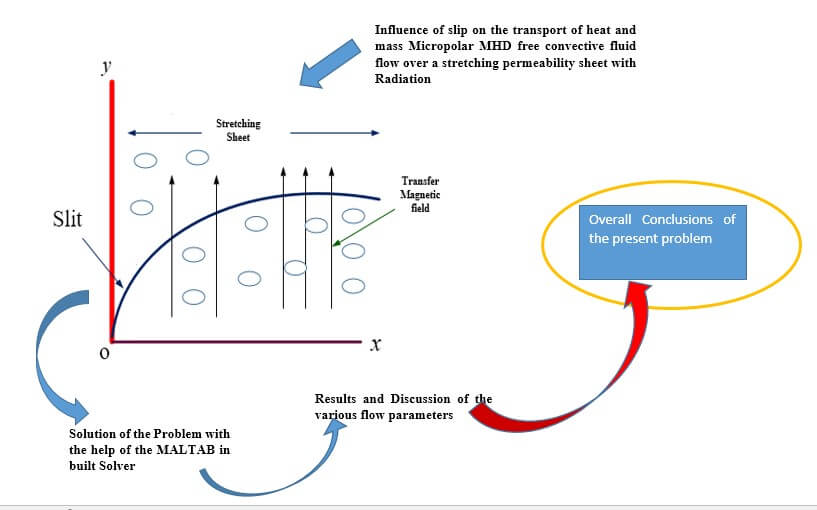 Open Access
Open Access
ARTICLE
Mathematical Study of MHD Micropolar Fluid Flow with Radiation and Dissipative Impacts over a Permeable Stretching Sheet: Slip Effects Phenomena
1
Department of Mathematics, Institute of Aeronautical Engineering, Hyderabad, India
2
Faculty of Engineering, Future University in Egypt, New Cairo, Egypt
3
Department of Mathematics, JNTUH University College of Engineering, Science & Technology, Hyderabad, India
4
Department of Mathematics, Kakatiya Institute of Technology and Science, Telangana, India
* Corresponding Author: B. Shankar Goud. Email:
(This article belongs to the Special Issue: Computational and Numerical Advances in Heat Transfer: Models and Methods I)
Frontiers in Heat and Mass Transfer 2023, 21, 539-562. https://doi.org/10.32604/fhmt.2023.043023
Received 20 June 2023; Accepted 21 August 2023; Issue published 30 November 2023
Abstract
The purpose of this research is to investigate the influence that slip boundary conditions have on the rate of heat and mass transfer by examining the behavior of micropolar MHD flow across a porous stretching sheet. In addition to this, the impacts of thermal radiation and viscous dissipation are taken into account. With the use of various computing strategies, numerical results have been produced. Similarity transformation was utilized in order to convert the partial differential equations (PDEs) that regulated energy, rotational momentum, concentration, and momentum into ordinary differential equations (ODEs). As compared to earlier published research, MATLAB inbuilt solver solution shows an extremely good correlation in exceptional instances. In exceptional instances, the present MATLAB inbuilt solver solution has a very excellent connection with the findings of the previously published investigations. A variety of flow field factors impact the Nusselt number, the wall couple shear stress, the friction factor, Sherwood numbers the dimensionless distributions discussed in detail. When the Eckert number rises, the temperature rises, and the Schmidt number falls, the concentration falls. Velocity increases with increases in the material factor but drops with increases in the magnetic parameter and the surface condition factor.Graphic Abstract

Keywords
Cite This Article
 Copyright © 2023 The Author(s). Published by Tech Science Press.
Copyright © 2023 The Author(s). Published by Tech Science Press.This work is licensed under a Creative Commons Attribution 4.0 International License , which permits unrestricted use, distribution, and reproduction in any medium, provided the original work is properly cited.


 Submit a Paper
Submit a Paper Propose a Special lssue
Propose a Special lssue View Full Text
View Full Text Download PDF
Download PDF Downloads
Downloads
 Citation Tools
Citation Tools